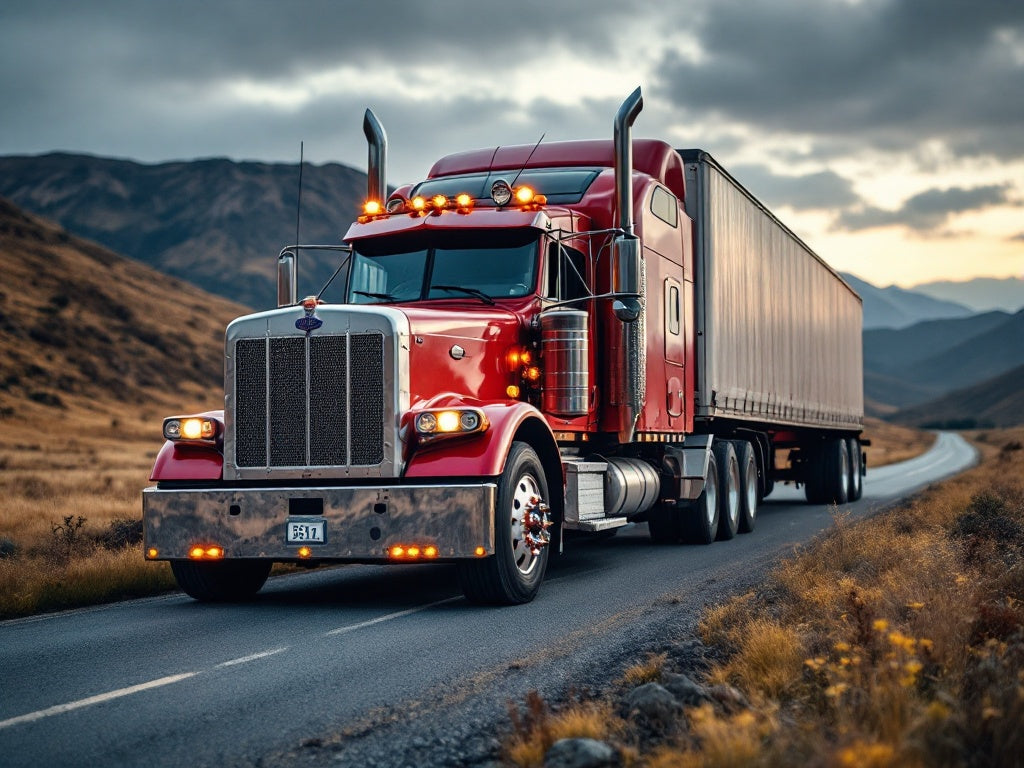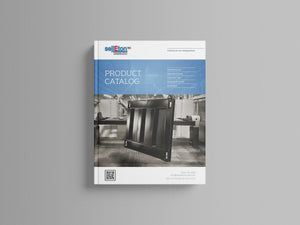
Heavy Duty Precision: How Truck Weight Scales Streamline Logistics
The Importance of Accurate Truck Weighing in Transportation and Logistics
In the world of transportation and logistics, precision is everything. Ensuring that trucks carry the correct load weight is not just a matter of operational efficiency but also a critical safety and legal requirement. A reliable truck weight scale helps streamline logistics by providing accurate weight measurements that prevent overloading, reduce wear and tear on vehicles, and ensure compliance with regulatory standards. Truck weight scales must be legal for trade to ensure compliance with regulatory standards set by the National Type Evaluation Program (NTEP).
Overloading a truck can lead to costly consequences, including fines, road accidents, and accelerated damage to the vehicle and infrastructure. Conversely, underutilizing a truck’s capacity results in wasted resources. By investing in accurate weight scales for trucks, businesses can optimize load management, reduce operational costs, and boost overall efficiency.
Benefits of Truck Scales
Truck scales offer numerous benefits to businesses and industries that rely on accurate vehicle weighing. Some of the key advantages include:
- Increased Efficiency: Truck scales enable quick and accurate weighing, significantly reducing the time spent on weighing vehicles. This efficiency translates to faster turnaround times and improved productivity.
- Improved Accuracy: With precise weight readings, truck scales minimize errors and discrepancies, ensuring that every load is correctly measured. This accuracy is crucial for maintaining operational integrity and customer trust.
- Enhanced Safety: By accurately weighing vehicles, truck scales help prevent overloading, which can lead to accidents and damage to both vehicles and infrastructure. Ensuring proper load distribution also contributes to safer road conditions.
- Cost Savings: Truck scales can help businesses save money by reducing the need for manual weighing, minimizing errors, and optimizing vehicle loading. Efficient load management leads to lower fuel consumption and reduced wear and tear on vehicles.
- Compliance with Regulations: Truck scales help businesses comply with regulations and laws related to vehicle weight, ensuring that vehicles are not overloaded and reducing the risk of fines and penalties. Compliance also protects the company’s reputation and operational licenses.
Types of Weight Scales for Trucks and Their Applications
Choosing the right truck scales for sale depends on your specific needs and the environment in which they will be used. Here are the main types of truck weight scales and their applications:
- Portable Truck Scales: Portable scales are designed for flexibility and mobility. They are ideal for industries where trucks need to be weighed in multiple locations, such as construction or agriculture. These vehicle scales are efficient for quick setups and accurate measurements in various environments.
- Weighbridge Truck Scales: Weighbridges are permanent scales installed at facilities like warehouses or logistics hubs. They are suitable for high-volume operations requiring frequent truck weighing. These duty truck scales are known for their durability, weight capacities, and compliance with NTEP regulations, ensuring reliability in commercial applications. Weighbridge truck scales can feature a steel deck, which offers ease of installation and capacity for heavy loads, making them suitable for demanding environments like mining and construction.
- Axle Scales: Axle scales measure the weight of each axle, ensuring even weight distribution. These axle truck scales are commonly used in compliance checks and by businesses needing quick and precise measurements.
- In Ground Truck Scales: In-ground truck scales are designed for shallow-pit applications, making them suitable for weighing truck axles when above-ground ramps are impractical. They offer a space-saving solution and are ideal for high-traffic environments.
- Concrete Deck Truck Scales: Truck scales featuring a concrete deck are robust and suitable for various demanding applications such as mining, heavy construction, and waste management. They emphasize durability, load capacity, and advanced technology, including hydraulic load cells and ease of installation.
- Onboard Truck Scales: These scales are integrated into the truck itself, providing real-time weight measurements during transit. They are particularly useful for long-haul transportation and industries like mining.
- Load Cell Scales: Load cell technology ensures precise measurements and is a feature commonly found in both portable and permanent truck scales.
Each type of truck scale for sale offers unique benefits, making it important to select the one that aligns with your operational requirements.
Key Features to Consider When Purchasing a Truck Weight Scale
Investing in the right truck scales for sale is crucial for ensuring accuracy and efficiency. Here are the key features to evaluate:
- Accuracy and Precision: Look for scales with high accuracy levels to avoid penalties and maintain compliance with regulations.
- Durability and Build Quality: Since truck scales are exposed to heavy loads and harsh environments, choose a model built with robust materials like steel or reinforced concrete.
- Capacity: Ensure the scale can handle the maximum weight of the trucks and their cargo in your operations.
- Ease of Use: User-friendly controls, automated systems, and easy installation can significantly reduce the time spent on weighing procedures.
- Connectivity and Data Integration: Advanced truck scales come with features like wireless connectivity, cloud integration, and data reporting capabilities, making it easier to track and analyze weight data.
- Portability: For businesses that require mobility, portable scales are a versatile and cost-effective option.
- Modular Design: Scales with a modular design allow for simple installation and adaptability for various weighing needs. They can be easily modified in size or structure, making them suitable for different job sites and applications.
- Weighing Terminal: A weighing terminal is an integral component of portable axle scale systems, enhancing functionality and user experience.
- Certification and Compliance: Ensure the scale is certified and meets the industry standards required in your region.
Choosing the right truck weight scale with these features will not only enhance your operations but also protect your business from potential risks.
Accuracy and Calibration
Accuracy and calibration are critical components of truck scales. To ensure accurate weight readings, truck scales must be properly calibrated and maintained. Key factors to consider include:
- Calibration Frequency: Regular calibration is essential to ensure that truck scales remain accurate and reliable. Depending on usage and environmental conditions, scales may need to be calibrated monthly, quarterly, or annually.
- Calibration Methods: There are various calibration methods available, including manual and automated calibration. Manual calibration involves using certified weights to adjust the scale, while automated systems can perform self-calibration at set intervals.
- Accuracy Standards: Truck scales must meet specific accuracy standards, such as those set by the National Type Evaluation Program (NTEP). Adhering to these standards ensures that the scales provide reliable and consistent measurements.
- Certification: Look for truck scales that are certified by reputable organizations, such as the International Society of Automation (ISA). Certification indicates that the scales have been tested and meet industry standards for accuracy and performance.
Software and Integration
Truck scales can be integrated with various software systems to enhance their functionality and provide additional benefits. Key considerations include:
- Data Management: Truck scales can be integrated with data management software to track and analyze weight data. This integration allows for better record-keeping, reporting, and decision-making based on accurate weight information.
- Automation: Truck scales can be automated to streamline the weighing process and reduce manual errors. Automated systems can capture weight data, generate reports, and even trigger alerts for overloading or other issues.
- Integration with Other Systems: Truck scales can be integrated with other systems, such as inventory management and accounting software. This integration ensures seamless data flow across different business functions, improving overall efficiency.
- Cloud-Based Solutions: Cloud-based solutions provide remote access to weight data and enable real-time monitoring. This capability is particularly useful for businesses with multiple locations or those that require remote oversight of their operations.
Compliance with Weight Regulations and Avoiding Penalties
Compliance with weight regulations is a critical aspect of logistics management. Overloaded trucks pose significant risks to road safety and infrastructure, prompting governments to enforce strict weight limits. Non-compliance can lead to:
- Hefty Fines: Overloaded trucks are subject to fines that can escalate with repeat offenses.
- Operational Delays: Trucks caught in non-compliance checks may face delays, disrupting schedules.
- License Suspension: Repeated violations can lead to license suspension or revocation.
- Reputation Damage: Consistent non-compliance can harm a company’s reputation, impacting client trust.
Using a certified truck scale for sale ensures compliance with regulations by providing precise weight measurements. Truck scales are available in a wide range of sizes, ranging from small portable units to large permanent installations. Many modern truck scales also include features like automatic reporting, making it easier to maintain records and avoid disputes.
Future of Truck Scales
The future of truck scales is likely to be shaped by advances in technology and changing industry needs. Potential trends and developments to watch include:
- Increased Use of Automation: Automation is likely to play a larger role in truck scales, enabling faster and more accurate weighing. Automated systems can reduce human error and improve operational efficiency.
- Integration with Emerging Technologies: Truck scales may be integrated with emerging technologies, such as artificial intelligence (AI) and the Internet of Things (IoT). These technologies can enhance data analysis, predictive maintenance, and real-time monitoring.
- Greater Emphasis on Accuracy and Calibration: As regulations and standards continue to evolve, there may be a greater emphasis on accuracy and calibration in truck scales. Advanced calibration techniques and stricter compliance requirements will ensure precise measurements.
- Increased Focus on Sustainability: Truck scales may be designed with sustainability in mind, using materials and technologies that reduce environmental impact. This focus on sustainability aligns with broader industry trends towards eco-friendly practices.
Conclusion
Accurate truck weighing is essential for maintaining efficiency, safety, and compliance in the transportation and logistics industries. Whether you need a portable scale for flexible operations or a permanent weighbridge for high-volume use, choosing the right truck weight scale is key to optimizing your operations. Businesses should consider investing in a new scale to take advantage of the latest technology and features.
At Selleton Scales, we offer a wide range of truck scales for sale to meet diverse business needs. Explore our collection of certified truck scales here and take the first step towards streamlining your logistics process today!
